新概念英语第1册第103-104课重点语法.doc
- 格式:doc
- 大小:33.01 KB
- 文档页数:3
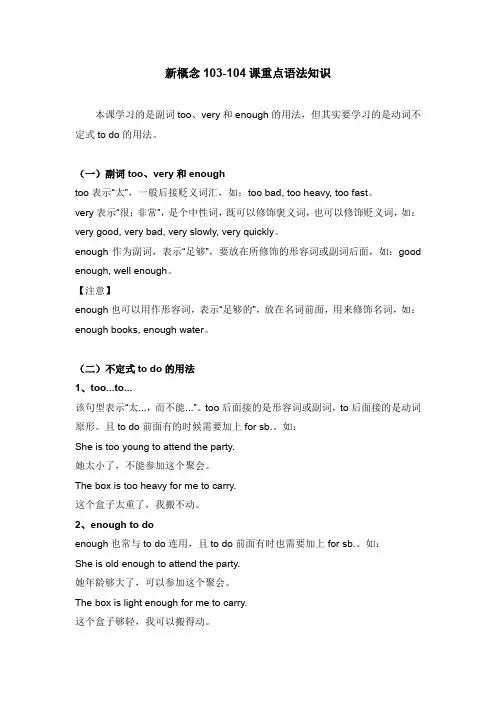
新概念103-104课重点语法知识本课学习的是副词too、very和enough的用法,但其实要学习的是动词不定式to do的用法。
(一)副词too、very和enoughtoo表示“太”,一般后接贬义词汇,如:too bad, too heavy, too fast。
very表示“很;非常”,是个中性词,既可以修饰褒义词,也可以修饰贬义词,如:very good, very bad, very slowly, very quickly。
enough作为副词,表示“足够”,要放在所修饰的形容词或副词后面,如:good enough, well enough。
【注意】enough也可以用作形容词,表示“足够的”,放在名词前面,用来修饰名词,如:enough books, enough water。
(二)不定式to do的用法1、too...to...该句型表示“太...,而不能...”。
too后面接的是形容词或副词,to后面接的是动词原形。
且to do前面有的时候需要加上for sb.。
如:She is too young to attend the party.她太小了,不能参加这个聚会。
The box is too heavy for me to carry.这个盒子太重了,我搬不动。
2、enough to doenough也常与to do连用,且to do前面有时也需要加上for sb.。
如:She is old enough to attend the party.她年龄够大了,可以参加这个聚会。
The box is light enough for me to carry.这个盒子够轻,我可以搬得动。
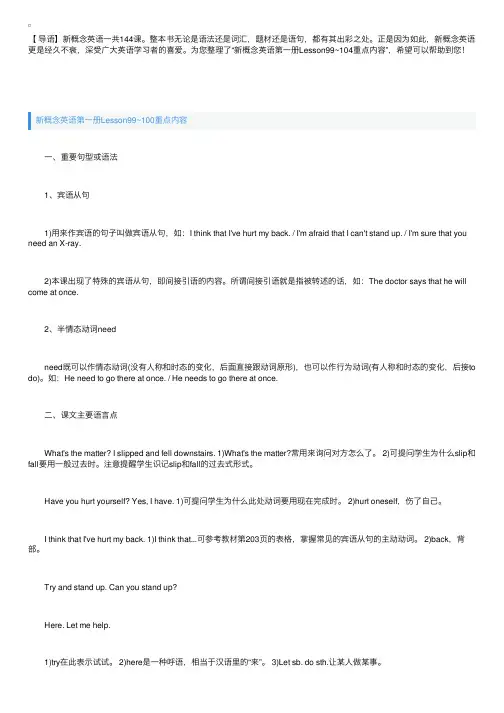
【导语】新概念英语⼀共144课。
整本书⽆论是语法还是词汇,题材还是语句,都有其出彩之处。
正是因为如此,新概念英语更是经久不衰,深受⼴⼤英语学习者的喜爱。
为您整理了“新概念英语第⼀册Lesson99~104重点内容”,希望可以帮助到您!新概念英语第⼀册Lesson99~100重点内容 ⼀、重要句型或语法 1、宾语从句 1)⽤来作宾语的句⼦叫做宾语从句,如:I think that I've hurt my back. / I'm afraid that I can't stand up. / I'm sure that you need an X-ray. 2)本课出现了特殊的宾语从句,即间接引语的内容。
所谓间接引语就是指被转述的话,如:The doctor says that he will come at once. 2、半情态动词need need既可以作情态动词(没有⼈称和时态的变化,后⾯直接跟动词原形),也可以作⾏为动词(有⼈称和时态的变化,后接to do)。
如:He need to go there at once. / He needs to go there at once. ⼆、课⽂主要语⾔点 What's the matter? I slipped and fell downstairs. 1)What's the matter?常⽤来询问对⽅怎么了。
2)可提问学⽣为什么slip和fall要⽤⼀般过去时。
注意提醒学⽣识记slip和fall的过去式形式。
Have you hurt yourself? Yes, I have. 1)可提问学⽣为什么此处动词要⽤现在完成时。
2)hurt oneself,伤了⾃⼰。
I think that I've hurt my back. 1)I think that...可参考教材第203页的表格,掌握常见的宾语从句的主动动词。
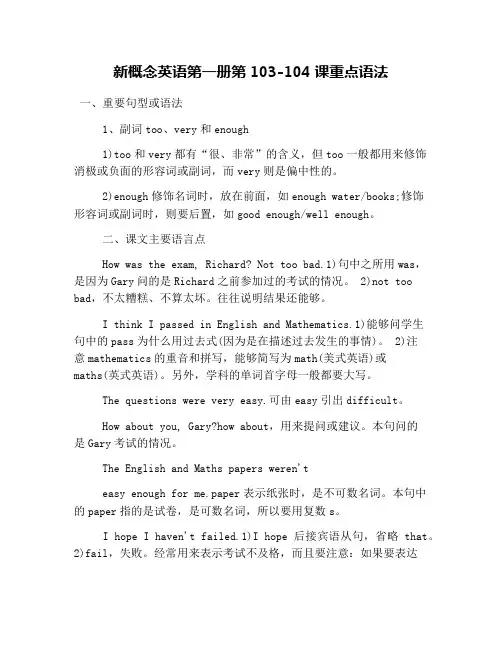
新概念英语第一册第103-104课重点语法一、重要句型或语法1、副词too、very和enough1)too和very都有“很、非常”的含义,但too一般都用来修饰消极或负面的形容词或副词,而very则是偏中性的。
2)enough修饰名词时,放在前面,如enough water/books;修饰形容词或副词时,则要后置,如good enough/well enough。
二、课文主要语言点How was the exam, Richard? Not too bad.1)句中之所用was,是因为Gary问的是Richard之前参加过的考试的情况。
2)not too bad,不太糟糕、不算太坏。
往往说明结果还能够。
I think I passed in English and Mathematics.1)能够问学生句中的pass为什么用过去式(因为是在描述过去发生的事情)。
2)注意mathematics的重音和拼写,能够简写为math(美式英语)或maths(英式英语)。
另外,学科的单词首字母一般都要大写。
The questions were very easy.可由easy引出difficult。
How about you, Gary?how about,用来提问或建议。
本句问的是Gary考试的情况。
The English and Maths papers weren'teasy enough for me.paper表示纸张时,是不可数名词。
本句中的paper指的是试卷,是可数名词,所以要用复数s。
I hope I haven't failed.1)I hope后接宾语从句,省略that。
2)fail,失败。
经常用来表示考试不及格,而且要注意:如果要表达某门学科考试不及格,直接用“fail+学科”。
如:He failed English.I think I failed the French paper.注意fail的用法。
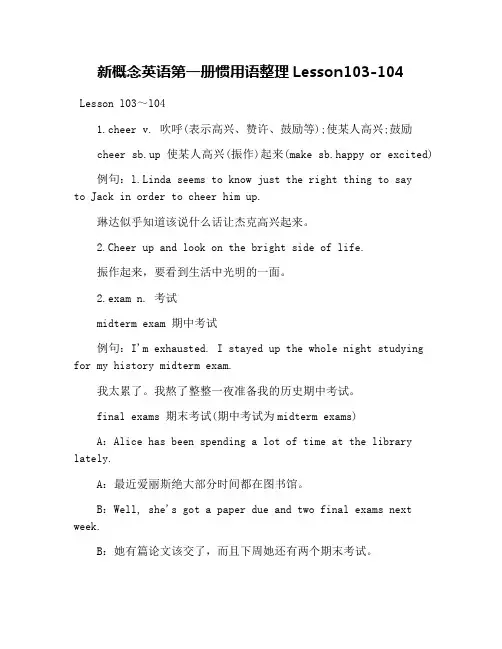
新概念英语第一册惯用语整理Lesson103-104
Lesson l03~l04
1.cheer v. 吹呼(表示高兴、赞许、鼓励等);使某人高兴;鼓励
cheer sb.up 使某人高兴(振作)起来(make sb.happy or excited)
例句:l.Linda seems to know just the right thing to say
to Jack in order to cheer him up.
琳达似乎知道该说什么话让杰克高兴起来。
2.Cheer up and look on the bright side of life.
振作起来,要看到生活中光明的一面。
2.exam n. 考试
midterm exam 期中考试
例句:I'm exhausted. I stayed up the whole night studying for my history midterm exam.
我太累了。
我熬了整整一夜准备我的历史期中考试。
final exams 期末考试(期中考试为midterm exams)
A:Alice has been spending a lot of time at the library lately.
A:最近爱丽斯绝大部分时间都在图书馆。
B:Well, she's got a paper due and two final exams next week.
B:她有篇论文该交了,而且下周她还有两个期末考试。
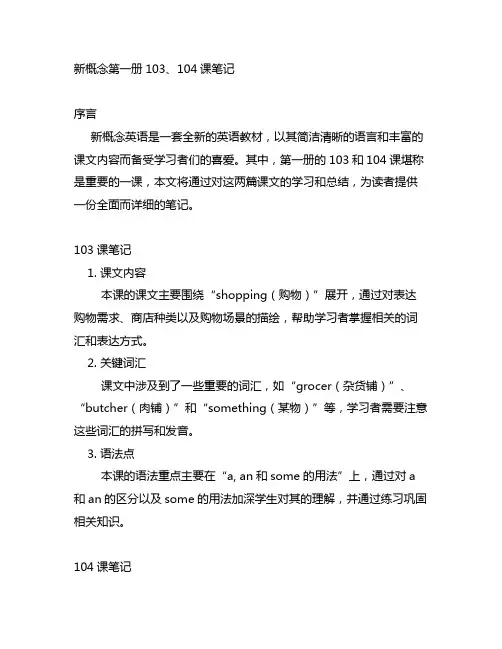
新概念第一册103、104课笔记序言新概念英语是一套全新的英语教材,以其简洁清晰的语言和丰富的课文内容而备受学习者们的喜爱。
其中,第一册的103和104课堪称是重要的一课,本文将通过对这两篇课文的学习和总结,为读者提供一份全面而详细的笔记。
103课笔记1. 课文内容本课的课文主要围绕“shopping(购物)”展开,通过对表达购物需求、商店种类以及购物场景的描绘,帮助学习者掌握相关的词汇和表达方式。
2. 关键词汇课文中涉及到了一些重要的词汇,如“grocer(杂货铺)”、“butcher(肉铺)”和“something(某物)”等,学习者需要注意这些词汇的拼写和发音。
3. 语法点本课的语法重点主要在“a, an和some的用法”上,通过对a 和an的区分以及some的用法加深学生对其的理解,并通过练习巩固相关知识。
104课笔记1. 课文内容本课的课文主要是讲述一个女士迷路的故事,通过对路线指引和方向描述的学习,帮助学习者提高在类似情境下的应变能力。
2. 关键词汇课文中涉及到了一些关于方向和地点的词汇,如“cross(穿过)”、“turn(转弯)”和“road(道路)”等,学习者需要对这些词汇进行掌握。
3. 语法点本课的语法重点主要在“介词的使用”上,通过对in, on和at等介词的运用进行学习,加深学生对其应用范围和用法的理解。
总结通过对这两篇课文的学习和总结,我们不仅深入了解了购物和迷路等日常生活场景下的英语表达方式,更加熟悉了一些重要的词汇和语法知识。
在学习新概念英语的过程中,我们需要不断总结经验,加强练习,才能够更好地掌握英语,提高英语交流能力。
结语通过这篇笔记,相信读者们能够对新概念第一册的103和104课有更加深入的了解,对于之后的学习和复习也能够更有针对性和方向性。
希望大家在学习过程中能够坚持不懈,不断提高自己的英语能力。
新概念第一册103、104课笔记扩展序言新概念英语是一套备受推崇的英语教材,其深入浅出的课文内容和丰富多彩的语法知识使其备受广大英语学习者的喜爱。
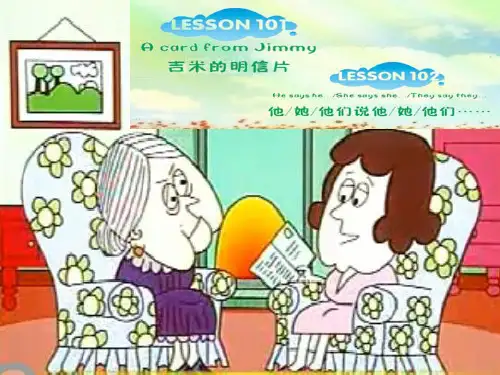
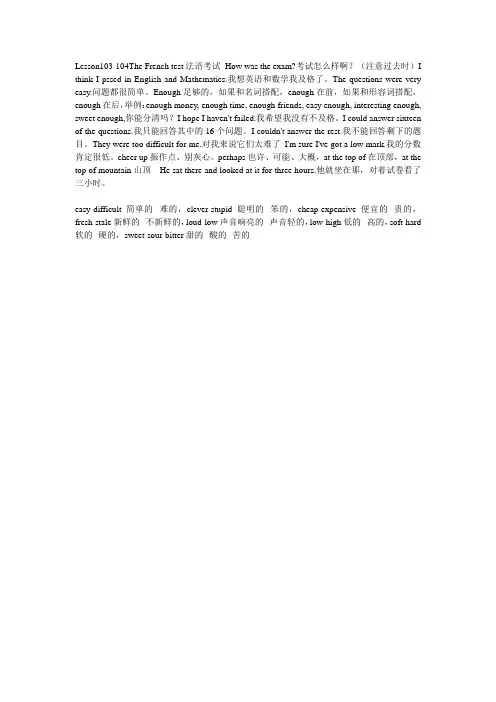
Lesson103-104The French test法语考试How was the exam?考试怎么样啊?(注意过去时)I think I pssed in English and Mathematics.我想英语和数学我及格了。
The questions were very easy.问题都很简单。
Enough足够的,如果和名词搭配,enough在前,如果和形容词搭配,enough在后,举例:enough money, enough time, enough friends, easy enough, interesting enough, sweet enough,你能分清吗?I hope I haven't failed.我希望我没有不及格。
I could answer sixteen of the questions.我只能回答其中的16个问题。
I couldn't answer the rest.我不能回答剩下的题目。
They were too difficult for me.对我来说它们太难了I'm sure I've got a low mark.我的分数肯定很低。
cheer up振作点、别灰心。
perhaps也许、可能、大概,at the top of在顶部,at the top of mountain山顶He sat there and looked at it for three hours.他就坐在那,对着试卷看了三小时。
easy-difficult简单的--难的,clever-stupid聪明的--笨的,cheap-expensive便宜的--贵的,fresh-stale新鲜的--不新鲜的,loud-low声音响亮的--声音轻的,low-high低的--高的,soft-hard 软的--硬的,sweet-sour-bitter甜的--酸的--苦的。
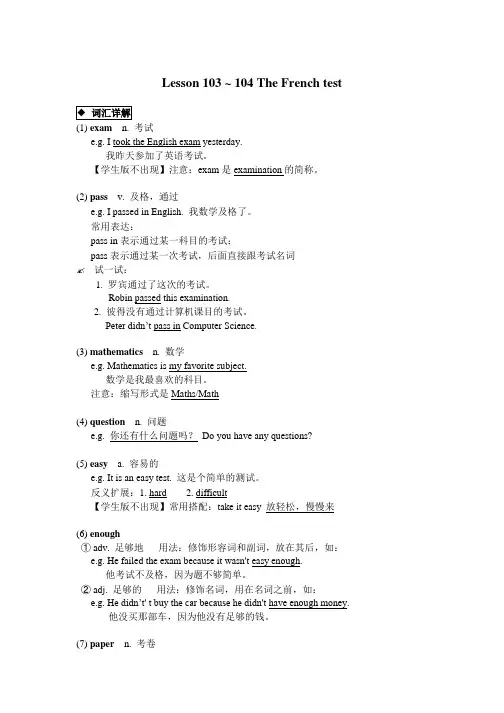
Lesson 103 ~ 104 The French test(1) exam n. 考试e.g. I took the English exam yesterday.我昨天参加了英语考试。
【学生版不出现】注意:exam是examination的简称。
(2) pass v. 及格,通过e.g. I passed in English. 我数学及格了。
常用表达:pass in表示通过某一科目的考试;pass表示通过某一次考试,后面直接跟考试名词试一试:1. 罗宾通过了这次的考试。
Robin passed this examination.2. 彼得没有通过计算机课目的考试。
Peter didn’t pass in Computer Science.(3) mathematics n. 数学e.g. Mathematics is my favorite subject.数学是我最喜欢的科目。
注意:缩写形式是Maths/Math(4) question n. 问题e.g. 你还有什么问题吗?Do you have any questions?(5) easy a. 容易的e.g. It is an easy test. 这是个简单的测试。
反义扩展:1. hard 2. difficult【学生版不出现】常用搭配:take it easy 放轻松,慢慢来(6) enough① adv. 足够地用法:修饰形容词和副词,放在其后,如:e.g. He failed the exam because it wasn't easy enough.他考试不及格,因为题不够简单。
② adj. 足够的用法:修饰名词,用在名词之前,如:e.g. He didn’t' t buy the car because he didn't have enough money.他没买那部车,因为他没有足够的钱。
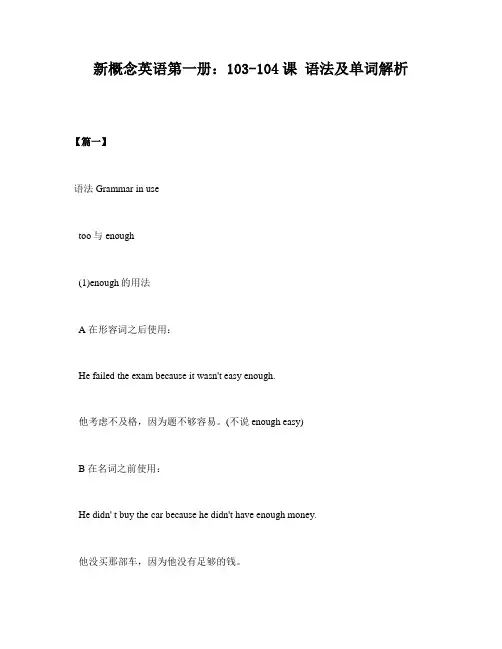
新概念英语第一册:103-104课语法及单词解析【篇一】语法 Grammar in usetoo与enough(1)enough的用法A 在形容词之后使用:He failed the exam because it wasn't easy enough.他考虑不及格,因为题不够容易。
(不说 enough easy)B 在名词之前使用:He didn' t buy the car because he didn't have enough money.他没买那部车,因为他没有足够的钱。
C 可以用在enough… for sb./sth.和enough… to do sth.结构之中:She hasn't got enough money for a holiday.她没有足够的钱去度假。
This dress isn't big enough for her.这件衣服对她来说不够大。
She's not old enough to live alone.她未到独自生活的年纪。
(2)too的用法A too 表示“过于”:I can't go out. It's too hot.我无法外出,太热了。
She couldn't answer the questions because they were too difficult for her.她无法回答问题,因为对她来说太难了。
B 可以用在too…for sb./sth.结构之中:This skirt is too big for me.这条裙子对她来说太大了。
It's too easy for me.这对我来说太容易了。
C 可以用在too…to do sth.结构之中:The exam was too difficult for him to pass.考试太难了,以至于他无法通过。
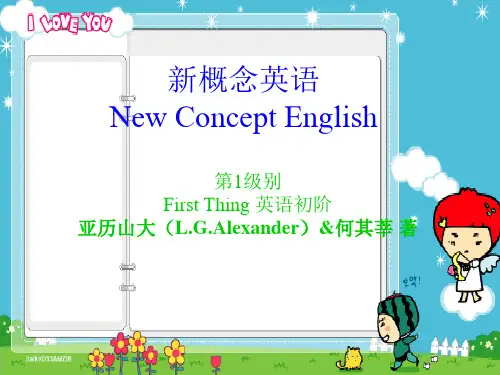
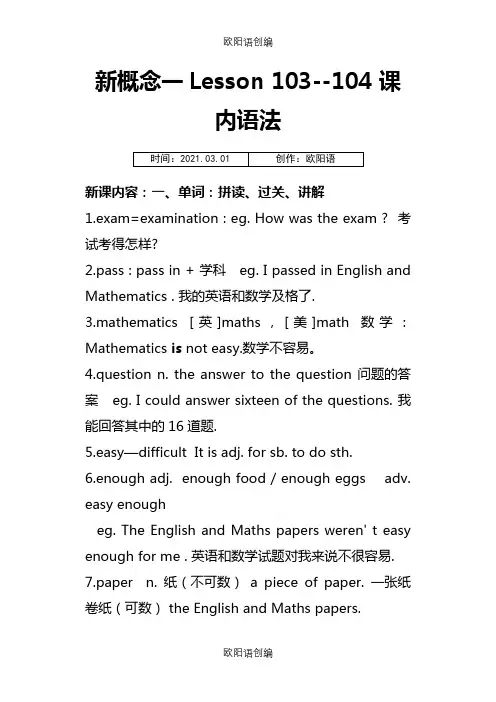
新概念一Lesson 103--104 课内语法新课内容:一、单词:拼读、过关、讲解1.exam=examination : eg. How was the exam ? 考试考得怎样?2.pass : pass in + 学科 eg. I passed in English and Mathematics . 我的英语和数学及格了.3.mathematics [英]maths,[美]math 数学:Mathematics is not easy.数学不容易。
4.question n. the answer to the question 问题的答案 eg. I could answer sixteen of the questions. 我能回答其中的16道题.5.easy—difficult It is adj. for sb. to do sth.6.enough adj. enough food / enough eggs adv. easy enougheg. The English and Maths papers weren' t easy enough for me . 英语和数学试题对我来说不很容易. 7.paper n. 纸(不可数)a piece of paper. 一张纸卷纸(可数) the English and Maths papers.8.fail ([反]succeed 失败;不及格:Your plans failed.你们的计划不成功。
9.look at…for+时间段看一看... (看了多久)二、词组1、试题 exam questions2、通过某一科考试pass in3、对某人来说太怎么样be too + adj. +forsb.4、别灰心cheer up5、临近、贴近next to6、在上部 at the top of7、写字 write words 8、三次three times三、语法1、how was/were /is /are… ? 怎么样?(用来征求他人意见或询问情况) eg: How was your vacation ? 你的假期怎么样?2、how about…? …怎么样?eg: How aboutgoing for a walk? 出去散步怎么样?3、 too 与enough 的用法⑴ enough 的用法A 在形容词之后使用eg: He failed the exam because it wasn' t easy enough .B 在名词之前使用eg: He didn’t buy the car because he didn' t have enough money.C 可用在 enough … for sb /sth 和enough …to do sth 结构之中eg: This dress isn' t big enough for her . She is not old enough to live alone.⑵too A too 表示“太…” eg: I can' t go out. It' s too hot.B 可用在 too … for sb/sth 结构之中 eg: It' s too easy for me .C 可以用在 too … to do sth. 结构之中 eg: The exam was too difficult for him to pass.一、单词连线exam 问题 pass 振作、振奋mathematics 其他的东西 answer 困难的question 家伙、人 hate 未及格、失败paper 分数 cheer 及格、通过mark 上方、顶部 fail 容易的rest 卷纸 difficult 足够的guy 考试 enough 讨厌top 数学 easy 回答二、选择1 Is your little sister old to go to school ? A tooB enoughC veryD quite2 The questions were difficult for me answer.A enough , toB very , toC much , toD too ,to3 I think I passed English and maths. A in B forC atD with4 Please write your name the top of the paper . Ain B at C on D for5 I sat there and looked my papers two hours. Aat , for B for , at C for , in D at ,after新概念一Lesson103-104课前测试一、单词:1.及格,通过2.问题3.容易的4.未及格,失败5.回答6.振奋,振作7.其他的东西8.家伙9.考卷10.讨厌11.缺席的(L67)二、词组1.通过某一科考试2.振奋起来3.邻近、贴近4.在卷子的顶端5.我确信6.对某人来说太难了三、单项选择1.I sat there and looked ______ my papers______ two hours.A.at, forB.for, atC.for, inD.at, after2.The English papers weren't easy______________ him.A.inB.atC.onD.for3.Is your little sister old__________ to go to school?A.tooB.enoughC.veryD.quite4.Please write your name______________ the top of the paper.A.inB.atC.onD.for5.The questions were _______difficult for me_________ answer.A.enough, toB.very, toC.much, toD.too, to6.The teacher__________ me is an English teacher.A.next inB.next toC.next forD.next on7.Perhaps I didn't __________ too____________.A.did, badlyB.do, badC.do, badlyD.did, bad8.Mathematics______________ difficult for me.A.beingB.isC.beD.are9.How are you?----______________.A.Fine, thanksB.GoodC.I'm elevenD.Yes,I am.10.I think I passed______________ English and maths.A.inB.forC.atD.with四、将下列句子改为反意疑问句1.Tom is a student,______________?2.She's had her lunch,______________?3.You'd better go to see your sister,______________?4.Let's go to school,______________?5.He hurt his foot yesterday,______________?五、翻译句子1.考试考的怎么样?2.或许我们考的还不太糟.3.但我回答不出其余的题。
新概念103-104课重点语法知识全文共四篇示例,供读者参考第一篇示例:新概念英语是最为经典的英语教材之一,广受全球学习者的喜爱。
其中第103-104课是重要的语法知识点,掌握这些知识点对于提高英语水平非常关键。
本文将为大家详细介绍第103-104课的重点语法知识。
1. 不定代词some, any, no不定代词some, any, no 在英语中扮演着重要的角色,它们用来表示数量或程度的未确定。
具体用法如下:some: 表示肯定的意思,通常用于肯定句中,表示“一些”,“一部分”等。
如:I have some friends.(我有一些朋友。
)2. 形容词比较级和最高级在英语中,形容词有比较级和最高级两种形式,用来比较程度。
其构造规则如下:比较级的构造:原级+ er + than,例如:He is taller than his brother.(他比他的哥哥高。
)3. 特殊疑问句的构成特殊疑问句用来询问特定的信息,常见的特殊疑问词包括:what, where, when, who, how等。
构造规则如下:特殊疑问词+助动词/系动词/情态动词+主语+其他部分,例如:What is your name?(你叫什么名字?)4. 定冠词和不定冠词定冠词the用来特指某个人或物,不定冠词a/an用来泛指某个人或物。
具体用法如下:定冠词the:用于特定的人或物,例如:The book on the table is mine.(桌子上的书是我的。
)不定冠词a/an:用于泛指某个人或物,例如:I have a dog.(我有一只狗。
)5. 过去进行时过去进行时用来表示过去某个时间点正在进行的动作。
构造规则如下:was/were + 动词+ -ing形式,例如:I was studying when he called me.(他给我打电话的时候,我正在学习。
)通过学习以上语法知识,相信大家对于新概念103-104课的重点内容有了更加全面的了解。
新概念英语每课重点(lesson103-104)The French test一、教学重点1、时态:一般过去时VS现在完成时。
2、词汇:could,couldn’t;too,very,enough3、句型:I could... / I couldn’t...二、讲解课文1、How was the exam? = How did the exam go? 考试已完,所以用过去时。
2、Not too bad. / Just so so. / Pretty good.3、I think I passed in English and Mathematics. 宾语从句pass 及格VS 不及格fail;在某一科目中要用介词in,但如果后面加的是某一种考试则不需要介词。
例如:pass/fail the English test/exam/paper4、How about you? = What about you? 用于询问情况(联系上下文)。
或者用于提建议:How about going to France for our next holiday?5、The English and Maths papers weren't easy enough for me.paper 纸张(不可数)a piece of paperpaper 试卷(可数)the English and Maths papersenough 足够地,副词,修饰形容词,用在形容词之后:easy enoughenough 足够的,形容词,修饰名词,用在名词之前:enough books/moneyfor 对…来说。
例如:The house is big enough for us. She’s old enough to go to school.6、I hope I haven't failed. I think I failed the French Test. 宾语从句。
出师表两汉:诸葛亮先帝创业未半而中道崩殂,今天下三分,益州疲弊,此诚危急存亡之秋也。
然侍卫之臣不懈于内,忠志之士忘身于外者,盖追先帝之殊遇,欲报之于陛下也。
诚宜开张圣听,以光先帝遗德,恢弘志士之气,不宜妄自菲薄,引喻失义,以塞忠谏之路也。
宫中府中,俱为一体;陟罚臧否,不宜异同。
若有作奸犯科及为忠善者,宜付有司论其刑赏,以昭陛下平明之理;不宜偏私,使内外异法也。
侍中、侍郎郭攸之、费祎、董允等,此皆良实,志虑忠纯,是以先帝简拔以遗陛下:愚以为宫中之事,事无大小,悉以咨之,然后施行,必能裨补阙漏,有所广益。
将军向宠,性行淑均,晓畅军事,试用于昔日,先帝称之曰“能”,是以众议举宠为督:愚以为营中之事,悉以咨之,必能使行阵和睦,优劣得所。
亲贤臣,远小人,此先汉所以兴隆也;亲小人,远贤臣,此后汉所以倾颓也。
先帝在时,每与臣论此事,未尝不叹息痛恨于桓、灵也。
侍中、尚书、长史、参军,此悉贞良死节之臣,愿陛下亲之、信之,则汉室之隆,可计日而待也。
臣本布衣,躬耕于南阳,苟全性命于乱世,不求闻达于诸侯。
先帝不以臣卑鄙,猥自枉屈,三顾臣于草庐之中,咨臣以当世之事,由是感激,遂许先帝以驱驰。
后值倾覆,受任于败军之际,奉命于危难之间,尔来二十有一年矣。
先帝知臣谨慎,故临崩寄臣以大事也。
受命以来,夙夜忧叹,恐托付不效,以伤先帝之明;故五月渡泸,深入不毛。
今南方已定,兵甲已足,当奖率三军,北定中原,庶竭驽钝,攘除奸凶,兴复汉室,还于旧都。
此臣所以报先帝而忠陛下之职分也。
至于斟酌损益,进尽忠言,则攸之、祎、允之任也。
愿陛下托臣以讨贼兴复之效,不效,则治臣之罪,以告先帝之灵。
若无兴德之言,则责攸之、祎、允等之慢,以彰其咎;陛下亦宜自谋,以咨诹善道,察纳雅言,深追先帝遗诏。
臣不胜受恩感激。
Lesson103-1041.exam n. 考试(examination 较为正式一些)He is a good student. He usually gets over 80 points in any exam.他是个好学生,他任何考试通常都在80分以上。
an entrance exam= an entrance examination 入学考试a midterm exam/ examination 期中考试a final exam/ a final examination 期末考试take an exam 参加考试pass an exam/ examination 考试及格fail an exam/ fail an examination 考试不及格cheat in an exam/ examination 考试作弊test (专项技能的)考试 driving test 驾照考试2.pass1) v. 及格,通过Only ten students passed the examination. 只有十名学生通过了考试。
pass in +具体学科pass in mathematics 通过数学考试 pass in Chinese 通过语文考试2) 通过,前进The road is only wide enough for cars to pass. 这条路宽度只够小汽车通过。
3)穿过,越过Every day I see him. He always passes me with a nod.每天我看到他,他都点个头和我擦肩而过。
4)把…递给… (接双宾语) pass sb sth= pass sth to sbPlease pass him the paper.= Please pass the paper to him. 请把这张纸传给他。
5)消失,结束Come on! You’ll be fine. The sorrow will pass. 好了,你会没事的,悲伤会过去的。
本学期要求:1.每节课作业必须保质保量完成(单元测试、背诵或复述课文)2.每节课前要听写单词、词组和重点句型,请课下认真复习3.有不会不懂的问题,随时与老师沟通联系,以取得更好的学习效果!祝大家学习愉快!孟老师:新概念英语第一册Lesson 103-Lesson104重点单词和词汇:(翻译成汉语)Exam_____pass_____mathematics_____question_____easy_____enough_____paper___ __fail_____answer_____mark_____rest_____difficult_____hate_____low_____cheer_____guy_____top_____clever_____stupid_____cheap_____expensive_____ fresh_____ stale_____low_____loud_____ high _____hard_____ sweet_____ soft _____ sour _____语法:too enough very 的用法too的用法too 表示“过去... 或太......”I can’t go out,it’s too hot . 我无法外出,太热了可以用在too.....for sb/sth 句型中This skirt is too big for me 这个裙子对我来说太大了It is too easy for me . 对我来说太简单了(3)可以用在too........to ....句型中“太........而不能......”This box is too heavy for me to carry . enough的用法(1)enough放在名词之前,形容词、副词之后。
I have enough money 。
(放在名词前) The box is big enough .(放在形容词、副词后)(2)可以用在enough… for sb / sth和enough… to do sth.结构之中:例子: This dress isn't big enough for her 。
新概念英语第 1 册第 103-104课重点语法
第 103-104 课的内容:
一、重要句型或语法
1、副词 too 、very 和 enough
1)too 和 very 都有“很、非常”的含义,但too 一般都用来修饰
消极或负面的形容词或副词,而very 则是偏中性的。
2)enough 修饰名词时,放在前面,如enough water/books;
修饰
形容词或副词时,则要后置,如good enough/well enough。
二、课文主要语言点
How was the exam, Richard? Not too bad.1) 句中之所用was,
2)not too
是因为 Gary 问的是 Richard 之前参加过的考试的情况。
bad,不太糟糕、不算太坏。
往往说明结果还能够。
I think I passed in English and Mathematics.1) 能够问学生
句中的 pass 为什么用过去式 ( 因为是在描述过去发生的事情) 。
2) 注
意 mathematics 的重音和拼写,能够简写为 math( 美式英语 ) 或
maths( 英式英语 ) 。
另外,学科的单词首字母一般都要大写。
The questions were very easy. 可由easy 引出difficult 。
,用来提问或建议。
本句问的How about you, Gary?how about
是 Gary 考试的情况。
The English and Maths papers weren't
easy enough for me.paper 表示纸张时,是不可数名词。
本句中的paper 指的是试卷,是可数名词,所以要用复数 s。
I hope I haven't failed.1)I hope后接宾语从句,省略that 。
2)fail,失败。
经常用来表示考试不及格,而且要注意:如果要表达
某门学科考试不及格,直接用“fail+ 学科”。
如:He failed English.
I think I failed the French paper. 注意fail 的用法。
I could answer sixteen of the questions.注意question
回答一般都用 answer。
They were very easy. But I couldn't answer the rest.the
的rest ,剩余的、其他的。
They were too difficult for me. me其实是句型“ too...to...”(太...
句中的
而不能 ...)
too difficult for
的使用。
French tests are awful, aren't they?1)awful ,可怕的、糟糕的。
2) 注意讲解反义疑问句的用法。
I hate them.hate ,讨厌、憎恶。
与like 相反。
I'm sure I've got a low mark.1)I'm sure
语从句。
2)have got,表示得到。
3)a low mark mark 相当于 score 。
后接省略 that的宾,成绩差、分数低。
Oh, cheer up!cheer up ,振作起来。
Perhaps we didn't do too badly.1)perhaps ,也许。
表示可能
性较低,所以语气显得更为委婉。
2) didn't(因为实在描述过去发生的事情所以用 too 来表示水准。
可提问学生为什么本句用
) 。
3)badly是负面的、不好的,
The guy next to me wrote his name at the top of the
paper.1)next to,靠近、临近、隔壁。
2)at the top of ,在 ... 的顶部、顶端。
Yes?注意用升调,表示疑问。
Then he sat there and looked at it fro three hours!
He didn't write a word!1) look at ,有些学生总会漏掉调效果更好。
三、双课补充内容注意 sit 的过去式为 sat 。
2) 注意
at 。
3) 如果在 word 前增加 single ,强
1、操练 too 、very 和 enough 的用法。
2、注意识记教材第212 页中的生词。